Previously on Drokk!: As we got tired by the ongoing reign of Garth Ennis on the 2000 AD episodes of the Dredd strip, two things in the previous episode pointed towards the future: John Wagner’s return to the series in the pages of the Judge Dredd Megazine, and a one-off 2000 AD story written by none other than a very young Mark Millar…

0:00:00-0:02:21: A brief-enough introduction lets everyone know that we’re reading Judge Dredd: The Complete Case Files Vol. 19, which collects material from 2000 AD and Judge Dredd Magazine — or, as it was called at the time, Judge Dredd: The Megazine — from 1993, written by Ennis, Wagner, Millar… and Grant Morrison, whose 12-part “Inferno” serial dominates both this volume and our discussion thereof.
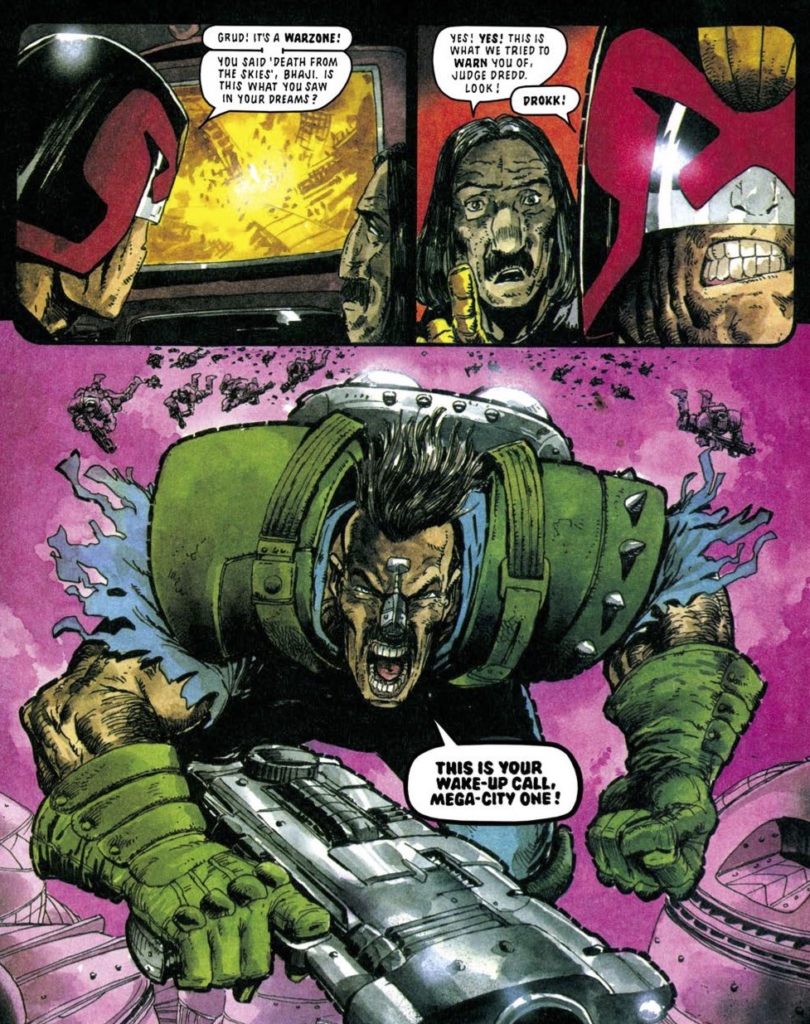
0:02:22-0:50:44: What looks as if it’s going to be a discussion of Mark Millar’s surprisingly strong contribution to the collection gets detoured into a lengthy discussion of “Inferno,” via the fact that Millar wrote a (not-collected-here) prologue series for 2000 AD called Purgatory. I compare that, perhaps unfairly, to DC’s Countdown to Final Crisis, and talk about Millar’s tendency towards nastiness, and then we end up talking all over “Inferno” properly, and what Grant Morrison gets right — the high concept at the heart of the story — and wrong, with the latter being, basically, “the execution of that high concept.”
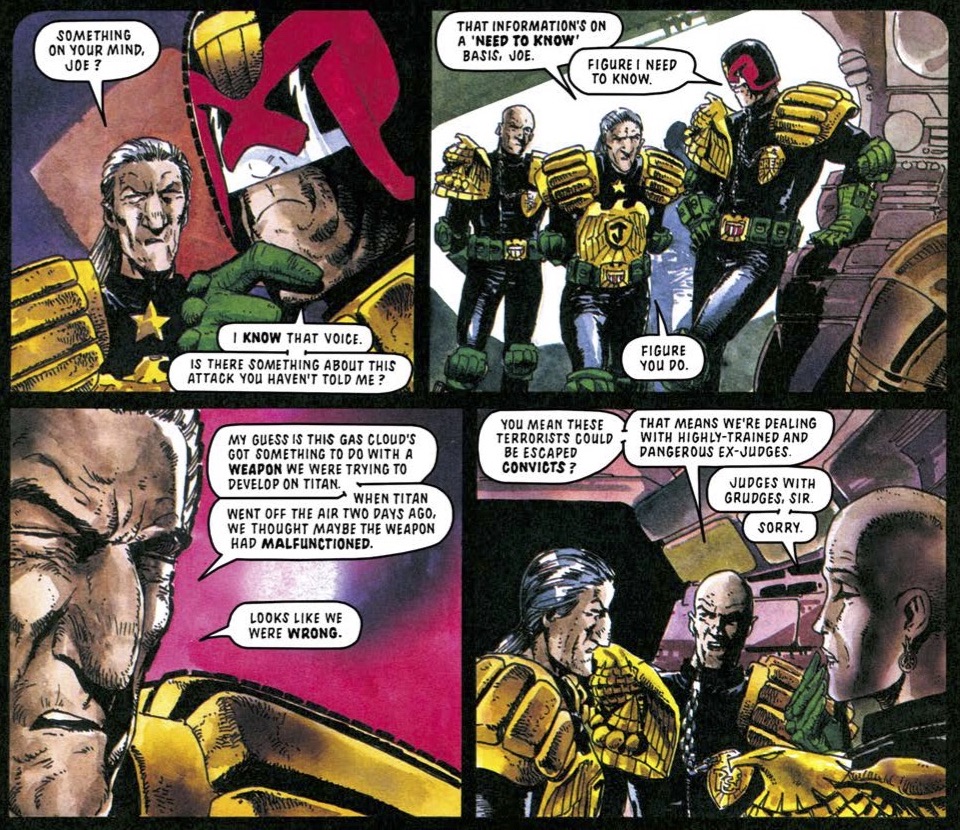
Jeff makes the argument that “Inferno” is Morrison using the story as a calling card for writing Dredd in the future, and we discuss the ways in which it works and doesn’t — the emptiness, the odd pacing and seeming disinterest in engaging with Dredd in any ways beyond the surface quips and violence, transforming it into a summer blockbuster movie… which it actually works relatively well as. Despite that, there’s an accidental lesson to be learned from the whole thing, when it comes to the Judges self-policing and the limits of their attempts to clean up their own messes. All this, and I also explain 2000 AD’s 1993 temporary relaunch the Summer Offensive!

0:50:45-1:06:32: With Morrison out the way, we approach Garth Ennis’ last work (for awhile) on the series and bemoan just how bad it is — at least he was consistently off, I guess…? — and talk about how surprised I am to enjoy Millar’s contributions as writer, as unsubtle as they may be. Under discussion: Is British newspaper the Daily Star an unexpected influence on Millar’s Dredd? Can Morrison and Millar write more entertaining Dredds because they’re not necessarily fans of the character or the strip? And, really, just how bad is Ennis’ last contribution, which seems to be entirely based around how much he didn’t like early 1990s late night show The Word?
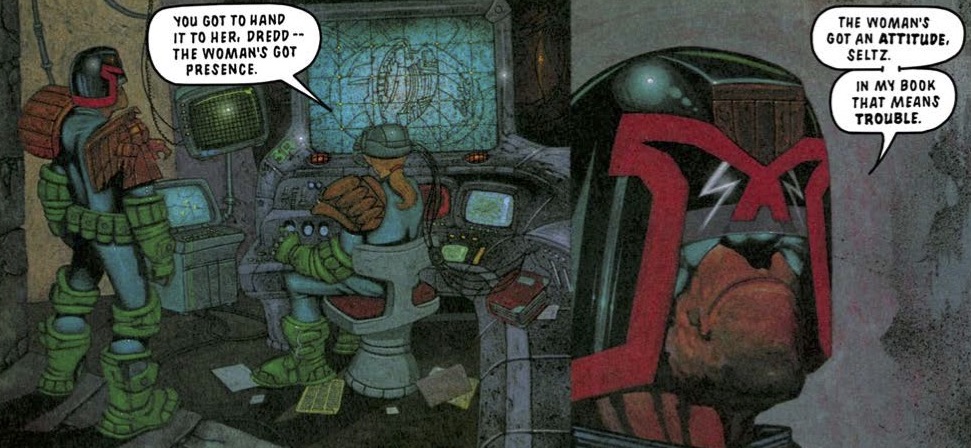
1:06:33-1:17:36: The unsung hero of Case Files 19 is, undoubtedly, John Smith, and as we move onto the Megazine material, Jeff and I marvel at how well he manages to “get” what John Wagner has done with the strip in a way that no-one else with the exception of Alan Grant has really managed — and, in the process, come up with the math for an ideal Dredd story: “Smart + Funny + Cruel.” Also discussed: John Smith’s love of the overwritten caption and the strange way in which Wagner will, eventually, follow Smith’s lead in that respect. (Kind of; Wagner doesn’t do “overwritten.”)
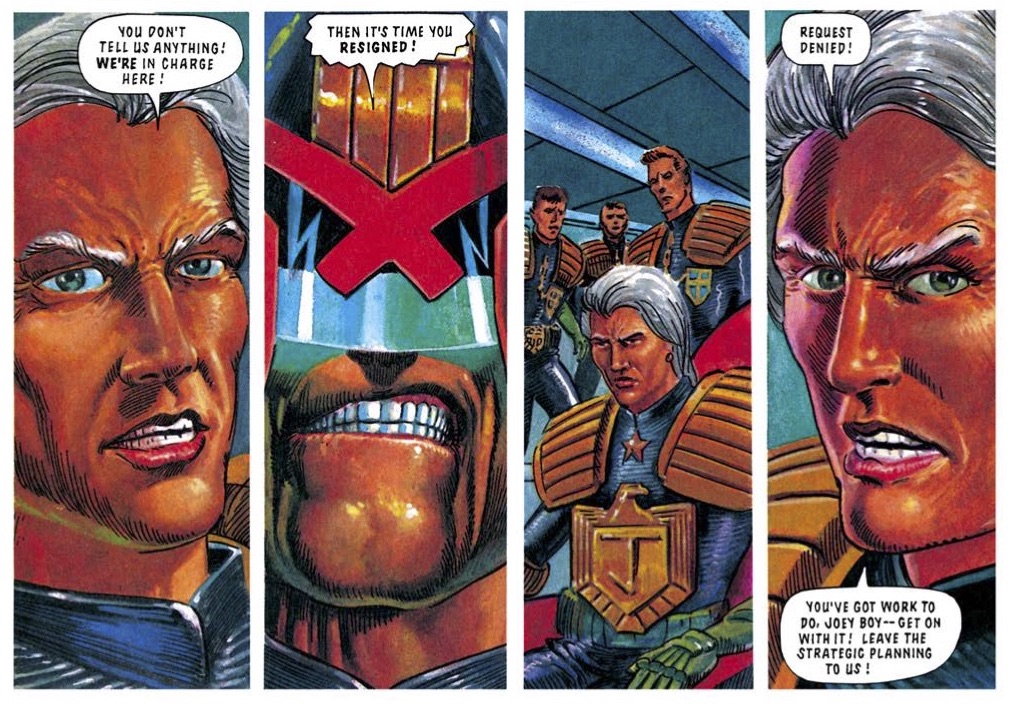
1:17:37-1:52:19: And so, to the Wagner material in Case Files 19, which includes our joint favorite story in the book, “Hottie House Siege” — a one-off so silly that we take a second to appreciate how much we enjoy Wagner’s stupid stories. (As opposed to his more serious stories.) An all-too-brief (in retrospect) mention of the Return of Slick Dickens leads us onto discussion of the third “Mechanismo” story, which is actually a discussion about how abruptly a character relationship shifts, and whether or not this is a problem of a character being shared between writers — and whether Dredd, by this point 16 years old as a strip, has started to encounter the problem that all long-running comic strips do, when audiences have to start picking and choosing their own head canons for the character. We also find out that Jeff is nostalgic for Case Files 10 and that era of Dredd, but really, after three volumes of Garth Ennis, who isn’t…?
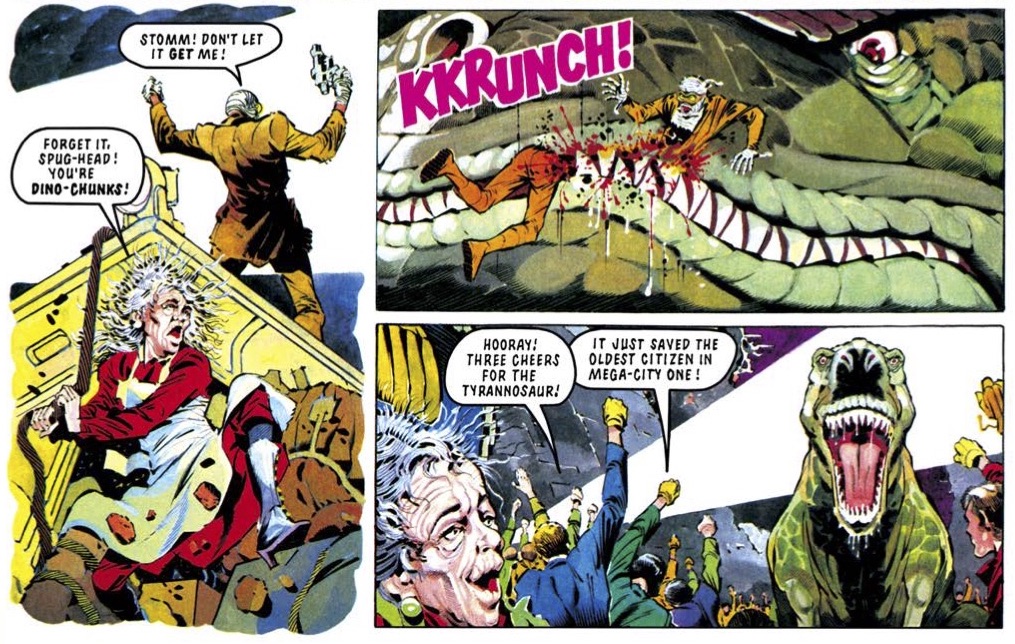
1:52:20-1:58:24: All told, is this volume Drokk or Dross? The answer might surprise you — it certainly surprised me — and we pick our favorite and least favorite stories from the volume: Good news for John Wagner, slightly less good if you’re Garth Ennis or Mark Millar. (Surprisingly, Grant Morrison skids through without getting near either category.)

1:58:25-end: As I tease the fact that we’re skipping out on regular Dredd for the next episode — we’ll be covering Judge Dredd: The Restricted Files Vol. 3 — we sign off in our regular fashion, by mentioning Tumblr, Twitter, Instagram, and Patreon. For those who’ve been reading and listening along, bless your collective cotton socks, as ever.


For those looking for a direct link to the episode: https://theworkingdraft.com/media/Drokk/DrokkEp21.mp3
You deciding this volume was not dross leads me to suspect you both have Drokkholm Syndrome! Really, bless you both if this volume was an improvement over the past several I haven’t read. I didn’t read the whole of this. I gave up on quite a few of the stories because of the degree to which I didn’t enjoy the writing and/or the art.
Jeff mentioning Gideon Stargrave led me to lift my copies of Near Myths from my shelf. The first thing of Morrison’s I read in October 1978 had a rape/murder. His art style was fun, I’m pretty sure I see Wrightson and some of the Spanish artists who worked for Jackie. Near Myths was a hoot, an anthology title that clearly believed that having two strips heavily influenced by Moorcock’s Cornelius stories was not one too many. I very much agreed. Given the Invisibles were mentioned I am practically contractually bound to refer to it as the Illuminatus Trilogy now featuring Jerry Cornelius.
Inferno was pretty dull, despite wonderful are from Ezquerra. Did Purgatory explain how Strucker stayed so fat on Titan. Surprised by the fat judge count in this volume.
I think I would have enjoyed it more if Grant had engaged with Truman Kaput and his fiction suit…
How bad a person does it make me that I couldn’t help being amused at how Jeff Lester, management professional, went straight to sympathizing with McGruder in a ”You don’t understand the hard choices she has to make! sort of way?
Also: I can’t possibly find any subtext in a story that admiringly imagines supporters of Rangers F.C. becoming a paramilitary organization that takes violent and brutal revenge on alien outsiders.
I gotta hand it to our hosts, their thorough deconstruction of each volume of the Case Files is just admirable. Every time I’m worried they won’t cover some aspect, they alway prove me an unnecessarily worried. I also very much appreciate when you provide some context for the times in which these stories were created, either via Jeff’s recounting of what he read in Thrillpower Overload or Graeme offering insights into the U.K. comics industry. I know that stuff falls outside of the scope of commenting on the stories themselves, but I enjoy it and find it endlessly fascinating.
A few thoughts on this volume, most of which could be considered padding to what was discussed in this episode.
-Not only did I feel I feel like I was missing out on consequential info in the Inferno story, I would say a good chunk of the 2000 A.D. stories in here felt like they were missing a last page, as if the rest of the story got lost to the mists of time, but hey! we have the last panel still so let’s just tack it on here. Don’t know about Millar, but perhaps Ennis and Morrison were too accustomed to the 22-page lengths of U.S. comics?
-I did enjoy this volume much, much more than the past three. Glad to know I’m not the only one. I was worried I might have been getting Drokkholm Syndrome, as David M. put it.
-Inferno had a great pitch but a terrible execution, so by my count that’s peak Morrison for you. Am I being uncharitable? (Thinks about Batman R.I.P., new 52 Superman run that went nowhere, and whatever the hell that Green Lantern run is.) No, I don’t think I am.
-Happy to see Ron Smith in here. As for the rest of the art, was there an editorial mandate at 2000 A.D. for everyone to “draw like Simon Bisley, but do it badly”? Because that’s the vibe I’m getting.
-A lot of these stories felt like throwbacks to classic Wagner-Grant stuff, but while entertaining to read, there’s not as much to sink your teeth into. I really was so excited by the chain of events Wagner kicked off with Letter from a Democrat, and I feel like once Ennis yanked that carpet out from under me, I haven’t been able to get my footing. I know Dredd as a strip has to run in perpetuity, but I was really looking forward to seeing where Wagner was going to take it.
-McGrudder. Ever since Wagner left and abandoned her, I feel she’s been really inconsistent, even when he’s writing her. She never felt more out of character than in the first Mechanismo story. She’s been such a Dredd partisan the whole time that the fact that she wouldn’t listen to him about the robots, and continues to go against him on them in this volumen, feels unearned. I can’t really articulate it, but as our hosts said, her disposition hasn’t been breadcrumbed well.
-Speaking of Mechanismo, I’ve had a real problem of late with the naming conventions in the Dredd-verse. I understand it’s always been goofy, a la the block names, but when it comes to sci-fi naming conventions…I dunno, they just lose me. (Like when the writer let Dredd use UK idioms and slang.) Mechanismo is a really, really terrible name. All robots are mechanismos, no? What makes robot judges deserving of that generic name? (I guess when other robots are named Walter and Kenneth, Mechanismo sounds appropriately more robotic?) They could have used Robo-judges or ro-judges or something. I wish I could recall the other naming conventions that just felt off, like something out of Fletcher Hanks. (Tubular spacial, anyone?)
-I dislike how Ennis and Millar make Dredd into a shoot first ask questions later type of character. I know Dredd is a violent fascist, but I don’t recall Wagner and Grant’s Dredd going in shooting unless the situation really called for it. I feel like this is a weird thing to criticize, because Dredd is a fascist and he’s a violent cop. But, like you were saying, there’s a version of these characters we all have in our head, and I guess that’s where mine is.
-Thank god they’re gonna have the credits for the Megazine strips next time. I was going to ask where you were finding them online.
Some scattered thoughts:-
– Definitely have to agree with our hosts that Millar comes as a surprising relief after Ennis.
I mean, he’s already Mark Millar, the writer who puts in these little moments of thoughtfulness and sensitivity as if just to make sure that his crassness comes across as that much worse, because he gives you glimpses of the writer that he could be, but isn’t.
So our hosts are absolutely right about the virtues of the memory-stealing crime, except that I think they underplay the cleverness of the rich person vicariously experiencing someone else’s pleasure at doing a good deed. It’s not just that he doesn’t want to replicate it himself – it’s that because he could steal the experience from someone else, he never will have to and the person who did the good deed is now deprived of that experience. It’s really disturbing and horrific, in a good way, conjuring up the nightmare of a world in which the most basic reward mechanism for doing the right thing is systematically sabotaged.
And Millar puts it in a story in which he then goes on to have someone’s head explode in a shower of gore.
But I think Millar’s still better than Ennis. Part of it is that he seems to be having fun: things like the Reservoir Dogs parody, or the throwaway Gentleman Thief bit. His Dredd is every bit as two-dimensional as Ennis’s – more so, probably – but Millar isn’t worshipful of his cartoon character, and there are worse things to do with Dredd than turn him into an absurd caricature of the ultimate stickler for The Rules, come what may.
-I think that adds a bit to Wagner’s third Mechanismo story, which I like more than our hosts. Part of it is that if you are going to do this very dated story about, goshdarnit, robots go wrong and become menaces, at least give me a hilariously crazy robot.
But, actually, I think it moves the idea forward a bit. There are only two things that are interesting here, and one is that idea that the robot’s personality is modeled on Dredd. This turns that up a notch, because it’s Dredd following his logic to an insane place. The robot becomes a caricature of Dredd.
Which is to say, Number 5 is a bit like the Dredd that’s appearing in the main stories in 2000 AD.
-The other thing that’s interesting is Dredd’s conflict with McGruder. Our hosts noted that this is wildly inconsistent with how McGruder is being portrayed in 2000 AD, which is true. The other thing is that it’s horribly backward-looking – McGruder is an overt commentary on Thatcher, and this aspect of Wagner’s writing doesn’t seem to have noticed that it’s not 1987 any more. Combined with the retro robots plot, there’s a sense here of an immensely skilled writer doing something that maybe doesn’t need to be done at all.
(And yes, it does go to some good places in later volumes. But it hasn’t yet.)
-This makes Morrison’s McGruder in Inferno quite interesting, I think. That this was part of the Summer Offensive (I knew vaguely that this had existed) is not a connection that I had made.
Honestly, when I read it, it came across Morrison expressing his contempt for Dredd as a character and his belief that the character’s time had passed. One, by putting Dredd in the most obvious possible story (think of Morrison’s mockery at the end of his Animal Man of the leaden obviousness of pitting the hero against his ideological opposite). Two, by reducing him to nothing more than a set of motifs – recurrent dramatic macho moments and one-liners. Essentially, this read as Morrison saying, “In 1993, this is all this character is, and this is all he’s good for, and it’s not much.”
The depiction of McGruder seemed interesting from that point of view, because Morrison seems to like her. She gets the line about the law being them, not buildings (an apparent riff on Thucydides, of all things), against Dredd’s rather obtuse objection. Then she gets the tough-person moment of defying Grice. She seems to serve as a character who’s there to point up what a crap character Dredd is. And not as a Thatcher expy – one has a sense that Morrison grasps that historical moment has passed.
But he seems to think that it could perfectly well have taken Dredd with it, and I think history has not backed Morrison up there.
– Inferno reads a little better if you read Purgatory first, because it does sort of assume that you have some interest already in the likes of Bundy and Strucker. Not that Purgatory does all that good a job of making them interesting.
It’s a bit irritating how much low-hanging fruit Purgatory leaves on the tree. One has the ghost of a sense that this is meant to be the flipside of the vision of necessary(?) order that is part of Wagner’s Mega-City One, a place where all the inherent nastiness and sadism comes out and is on the surface. Similarly, there’s the ghost of a sense that this is supposed to be a story in which Grice and the other prisoners, while unpleasant enough people, are more sympathetic than their captors, and that it is meant to emerge slowly that Grice is not in his right mind. But on neither count is it more than the ghost of a sense.
I wonder if Purgatory/Inferno might have been better off as a story about the Grice whom we actually saw in his original appearance, the true believer in the rule of the judges. Same basic plot, but instead of a Grice who’s just insanely keen on taking revenge and believes in Randomness and Chaos (because Dredd believes in Law and Order), a Grice who is genuinely trying to reset things to what he thinks they should be?
Hearing you describe “Titan” as a far superior take on “Purgatory/Inferno” and being prompted by this podcast to finally read the damn thing (Inferno) makes me realize that you could say the same thing about “Day Of Chaos”, which feels like a several thousand times better version of “Inferno” (portents of doom, the city besieged by a virus, urban combat, et al. probably), Inferno being kinda sheer macho action cliche (despite all the specific Dredd convention call outs, it reads like it’s all pointless power chords for an imagined general audience) and Chaos is a vast grueling story where you feel every instant, putting Dredd and the reader through the grinder.
A quick bit of trivia for Jeff. You know how you were lamenting the introduction of the time-stretcher in the Ladonna story as a bit of tech we’ll never see again? This isn’t its first appearance. It was first referenced way back in Prog 3 (!!) and again in an Annual story, Dr Panic (Collected Edition 3/Restricted Files 1). You get to see it used in one of the Daily Star Dredds in 1985, as well as the first issue of 1995’s Judge Dredd: Lawman of the Future (the brief-lived movie spin-off aimed at younger readers), but I’m not sure whether it’s been used since.